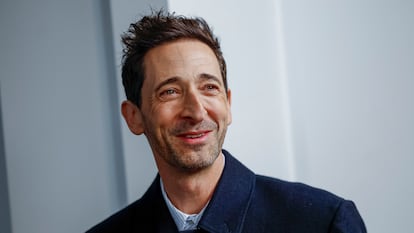
Adrien Brody: ‘In the face of rising antisemitism, we have to find again a way to learn from our past’
The actor is the favorite to win an Oscar for his role in ‘The Brutalist,’ where he plays László Tóth, an architect who survives the Nazi extermination and rebuilds his life in the United States

Adrien Brody, 51, finds acting painful. But he likes it. Entering a Madrid hotel room with a reserved demeanor, he clutches his coat tightly around his shirt. His expression only softens when discussing legendary basketball coach Pat Riley, the architect of the Los Angeles Lakers’ Showtime era, whom he portrayed in Winning Time: The Rise of the Lakers Dynasty.
But this Friday afternoon is devoted to dissecting another role: Hungarian architect László Tóth, brutalist pioneer and concentration camp survivor. Brody plays Tóth in The Brutalist, a movie about the architect’s harrowing life, directed by Brady Corbet. The performance has already sparked Oscar buzz, potentially earning Brody his second Academy Award. The New Yorker remains the youngest actor to win the Oscar for Best Actor, claiming it at age 29 for The Pianist. As awards season heats up, there’s a chance he’ll soon add a second statuette to his collection.
“I’m very selective, it’s true,” Brody admits. “To do something, I have to feel it’s worth the commitment. So, I had to wait. I have a great time working with Wes Anderson and painting at home,” he explains.
For seven years, for example, Brody chose to focus on restoring the Stone Barn Castle, a historic building he purchased in 2007 in upstate New York. “Now I paint, and in the meantime, I search,” he says. “Luckily, I’ve had very profound artistic experiences with great actors and directors.” Brody’s impressive résumé includes collaborations with cinematic legends such as Spike Lee, Francis Ford Coppola — who directed his film debut — Terrence Malick, Wes Anderson, Peter Jackson, Woody Allen, and Ken Loach. “Many of those roles were secondary characters, but they had substance,” he reflects, looking into space— a gesture he repeats from time to time.
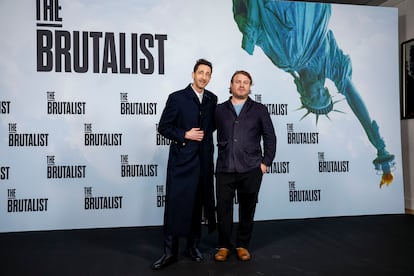
Brody wasn’t Brady Corbet’s first choice for The Brutalist. The two first met in 2019, when the director initially cast Joel Edgerton in the role. “I didn’t actually get to audition. As an actor, you have to get used to it. It’s a brutally competitive job, and there are very few roles you’ll remember for a lifetime. Sometimes you don’t even get to do them,” Brody reflects. “When I read Brady and Mona [Fastvold]’s script, I understood what it meant. So when they called me back after lockdown, of course I said yes.”
There was another reason Brody was determined to fight for the role: László Tóth could have been related to Brody. The actor has Jewish ancestry. His father is of Polish Jewish descent, while his maternal grandparents — one Jewish, the other Catholic — fled Hungary for the United States after the Soviet invasion in 1956. Some of Brody’s relatives perished in Nazi concentration camps.
“Of course, the resilience of my maternal grandparents resonates with me,” he says. “Taking on this role meant representing all that struggle for survival. My parents were very happy the day I won the Golden Globe.But my main intention here wasn’t simply to pay tribute to them, but to bring the complexity of the protagonist to life on screen.”
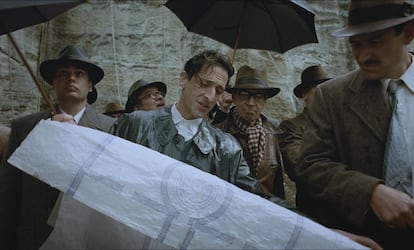
The Brutalist also echoes the struggles of the present day in other ways. For example, it sheds light on the plight of those forced to leave their homes, endure hardships in foreign lands, and often sacrifice their roots and culture while concealing their pain. “Unfortunately, this isn’t something that is new for humanity, is it?” Brody reflects. “It’s a tragedy that has repeated itself throughout history — generations fleeing oppression and violence. For centuries, many people have had to rethink the meaning of their lives and recover from the pain of the past.”
The conversation shifts to The Pianist, a film with which The Brutalist shares more than just Adrien Brody’s presence. “Maybe there are parallels,” he acknowledges, “but you have to put it in perspective. This fall, I was in London performing The Fear of 13,portraying Nick Yarris, a man who spent years on death row after being wrongfully convicted. It’s a true story — another example of injustice. I wasn’t going to pass on the opportunity, but I approached it as a service to an artistic cause and to a message far more important than myself.”
When the topic of Roman Polanski arises — the director was unable to enter the United States at the time of Brody’s Oscar win for The Pianist as he was at risk of being arrested for fleeing the country after being accused of sexual abuse — the actor’s publicist steps in. The interview is promptly redirected, with a reminder that questions should remain focused on The Brutalist.
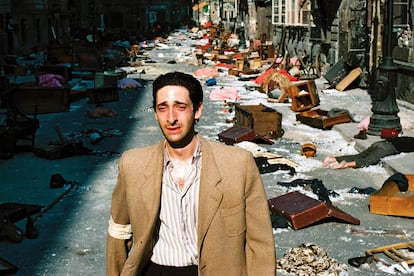
But Brody does not shy away from addressing the rise of antisemitism across the globe, despite a raised eyebrow from his publicist. While hesitant to discuss whether he has personally experienced it, he states: “I think the film makes it clear, doesn’t it? It exists, it has always been there, and now it is increasing. In the face of this antisemitism, we have to find again a way to learn from our past and at the same time leave it behind.”
The Brutalist clocks in at nearly four hours, including a 15-minute intermission. The film is a dual-toned journey: the first half evokes the epic grandeur of David Lean’s cinema, with sweeping passions and deeply humanist adventures, while the second half explodes into a raw, gritty intensity reminiscent of 1970s New Hollywood. How much can an actor contribute to such a meticulously crafted project? “A lot, and I feel an integral part of its project and tone. However, there was a script and an idea. Brady is like an open book, ready to communicate, and for you to read it and join the journey. And here we have cared about the complexity of the story,” Brody explains.
The process was intense, which proved beneficial for Brody as an actor. The Brutalist, visually stunning on screen, was shot in VistaVision for a 70-millimeter widescreen release. Although it recreates 1950s America, the film was completed in just 34 days, from March to May 2023, on a budget of €9.3 million ($9.7 million).
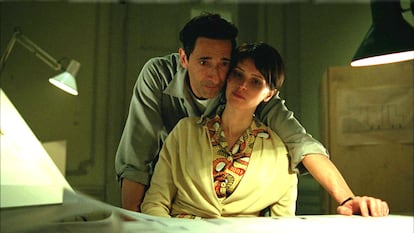
Brody admits that he enjoyed portraying Pat Riley in Winner Time. “What pains me is that I approached it thinking about the whole journey. I prepared for the third season, knowing it would showcase his rise as a coach, and I built up his character little by little. Now, with the series canceled, we won’t get to see his personal triumph with the Lakers.”
This sense of unfinished business may be why Brody is seeking more creative control in his future projects. He highlights Clean(2021), a project he co-wrote, starred in, and even composed the soundtrack for, as an example: “I poured my own worries and anger into it. It hurts me to see how poverty and despair are growing worldwide, especially among children. I feel like an artist, and I want to develop my own material more often, or support the creators I collaborate with. I am evolving in that direction.”
The final question brings Brody back to his Spanish experience: What does he remember of his bitter experience working on Manolete, where he portrayed the legendary bullfighter? “What do you mean by bitter?” he replies. The film took six years to finish, received scathing reviews, and had seven different versions released around the world. The publicist intervenes for the second time, blurting out: “Time’s up.” Before he closes his mouth, Brody, following orders, quickly adds: “Well, I’m just an actor.”

No comments:
Post a Comment